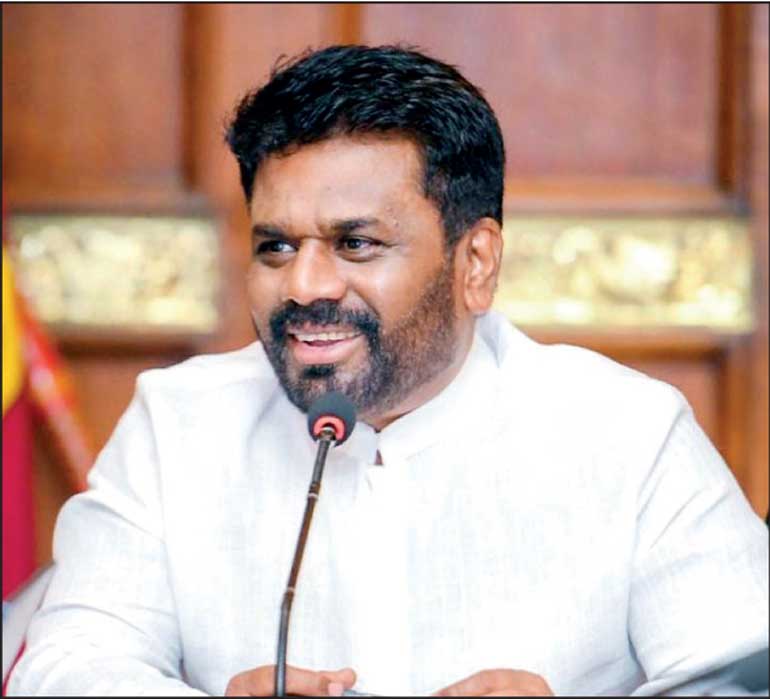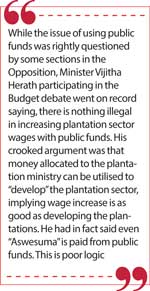Wednesday Feb 18, 2026
Wednesday Feb 18, 2026
Monday, 17 November 2025 00:26 - - {{hitsCtrl.values.hits}}

President and Finance Minister Anura Kumara Dissanayake
 On 14 November, the second reading of the Budget for the year 2026 was adopted in Parliament with a majority of 118 votes. That is no surprise with the JVP/NPP having 159 MPs in the current Parliament. It was also no surprise to see three Opposition MPs representing the plantation sector voting for the Budget, with statements that they do so, in favour of wage increases promised by the Government for the plantation sector workers.
On 14 November, the second reading of the Budget for the year 2026 was adopted in Parliament with a majority of 118 votes. That is no surprise with the JVP/NPP having 159 MPs in the current Parliament. It was also no surprise to see three Opposition MPs representing the plantation sector voting for the Budget, with statements that they do so, in favour of wage increases promised by the Government for the plantation sector workers.
None would oppose wage increases to any sector in an unaffordable context with increases in cost of living. What nevertheless needs to be clearly said and stressed is that, increasing salaries, adding allowances to the salary and any other increase to the take-home-pay is the sole responsibility of the “employer”. Salaries of Government employees are therefore decided by the Government as their employer, for which public funds are utilised. Payment of private sector salaries is the sole responsibility of the “private sector employer” with the Government only given responsibility to benchmark the national monthly “minimum wage” as policy.
The “salary increase” issue comes into debate with the JVP/NPP Government deciding to contribute to an increase in plantation sector wages with an “attendance allowance” paid from public funds totalling Rs. 5 billion in 2026. This would be an annual contribution from public funds, no Government would be able to withdraw. Perhaps increase, instead.
While the issue of using public funds was rightly questioned by some sections in the Opposition, Minister Vijitha Herath participating in the Budget debate went on record saying, there is nothing illegal in increasing plantation sector wages with public funds. His crooked argument was that money allocated to the plantation ministry can be utilised to “develop” the plantation sector, implying wage increase is as good as developing the plantations. He had in fact said even “Aswesuma” is paid from public funds.
 This is poor logic. Aswesuma is paid to “Citizens” who are accepted as poor and unable to meet the cost of basic needs. Not to wage workers in the private sector employed by businessmen. This decision by the JVP/NPP Government also creates an economically and politically corrupt precedent, with all private sector employees now given the “right to demand from Government” an increase to their salaries, leaving the employer free from such responsibility. If the plantation sector is eligible for wage increase funded by public money, so do all other private sector workers including those in FTZs too.
This is poor logic. Aswesuma is paid to “Citizens” who are accepted as poor and unable to meet the cost of basic needs. Not to wage workers in the private sector employed by businessmen. This decision by the JVP/NPP Government also creates an economically and politically corrupt precedent, with all private sector employees now given the “right to demand from Government” an increase to their salaries, leaving the employer free from such responsibility. If the plantation sector is eligible for wage increase funded by public money, so do all other private sector workers including those in FTZs too.
A Government using tax payer money to set off the salary increase of private sector employees is akin to adding public funds to an employer›s bank account, increasing his/hers profits at public cost. All private sector employers calculate employee salary increases against profits they pile. They would not decide on a salary increase if that is going to bite off a chunk from their profits. This salary increase on attendance with public funds to the plantation sector would therefore technically increase profit of plantation sector employers by Rs. 5 billion in 2026. This allowance on attendance, probably with increases, would have to be continued in 2027 and after with public funds no doubt. For now it will be about the Uva and the Central provinces at next year’s PC elections.
This raises the ultimate question, why should ordinary citizens fund an attendance allowance of private sector employees, who labour to provide profits to businessmen/women? Was it not better for the Government to have allocated that sum of Rs. 5 billion to education or health?
It is thus immoral and unprincipled for MPs to have voted for the Budget 2026, without mooting an amendment to replace that provision of allocating public funds for plantation worker salary increase, with one that proposes to fix the minimum monthly wage legally at least at Rs. 60,000 across all sectors.
(The author is political analyst/writer)